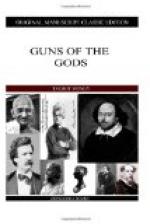“I came to speak of politics.”
“I listen.”
Samson leaned back and scrutinized his visitor with deliberate rudeness. Having the upper hand he proposed to hold it.
But Jinendra’s high priest was no beginner either in the game of Beggar-my-neighbor. He understood the value of a big trump to begin with, provided there is other ammunition in reserve.
“The whereabouts of the treasure of Sialpore is known!”
“The deuce it is!” said Samson, in good plain English. “Who knows it?” he demanded.
The high priest smiled.
Samson, as was natural, felt that tingling up and down the spine and quickening of the heart-beats that announces crisis in one’s personal affairs, but concealed it admirably. It was the high priest’s turn to speak. He waited.
“Half of that treasure belongs to the priesthood of Jinendra,” said the priest at last.
“Since when?”
“Since the beginning.”
“Why?”
“We were keepers of the treasure once years ago, before the English came. There came a time when the reigning rajah deceived us by a trick, including murder; and ever since the English took control the priests have had less and less authority. There has been no chance to— to bring any—to put pressure—to reestablish our rights. Nevertheless, our rights in the matter were never surrendered.”
“What do you mean by that exactly?”
“The English are now the real rulers of Sialpore.”
Samson nodded. That was a significant admission, coming from a Brahman priest.
“They should claim the treasure. But they can not claim it without knowing where it is. The priests of Jinendra are entitled to their half.”
“You mean you are willing that my government should take half the treasure, provided the priests of Jinendra get the other half of it?”
The priest moved his head and his lips in a way that might be taken to mean anything.
“If you know where the treasure is, dig it up,” said Samson, “and you shall have your answer!”
Yasmini in the heat of excitement had called Samson an idiot, but he was far from being that, as she knew as well as any one. He judged in that moment that if Jinendra’s priest knew really where the treasure was, he would never have come to drive a bargain for the half of it, but would have taken all and said nothing. On the other hand, it well might be that Gungadhura’s searchers had stumbled on it. In that case, there was that secret letter from headquarters hurriedly placed in his top drawer when the priest came in, that would give good excuse for putting screws on Gungadhura. A coup d’etat was not beyond the pale of possibility. As a champion of indiscretion and a judge of circumstances, he would dare. The gleam in his eyes betrayed that he would dare, and the priest grew uneasy.
“It is not I who know where the treasure is. I know who knows.”




